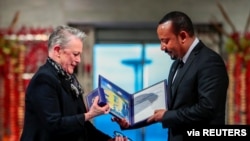Ethiopian Prime Minister Abiy Ahmed was awarded the Nobel Peace Prize this year, mainly for the 2018 deal he reached with Eritrea to end a long-running border conflict. In accepting the prize in Oslo on Tuesday, Abiy insisted the prize also belonged to his "partner and comrade in peace, President Isaias Afwerki, whose goodwill trust and commitment were vital in ending the two-decade deadlock between our countries.”
Many observers hoped the deal would spark political reforms in Eritrea, where Isaias has ruled with a heavy hand for years. But analysts and activists are increasingly skeptical the deal will stop Eritrea's government from oppressing its own citizens.
Since the deal, there have been no changes to laws designed to suppress political dissent and an independent media, and the government continues to impose indefinite military service on hundreds of thousands of people. While the borders between Ethiopia and Eritrea opened up in mid-2018, they were closed again after only three months as Eritreans left the country in large numbers.
Political analyst Goitom Gebreleul says that while there are some positive developments, there are two critical shortcomings when it comes to the results of the peace deal.
“Firstly, it was expected by the international community and by the Eritrean population at large that it would initiate political reforms inside Eritrea, which it has failed to do," he says. "Secondly, the border between Ethiopia and Eritrea remains undemarcated and the peace process, for this reason, remains incomplete. We can therefore say that rather than a transition from war to peace, what we see is a transition from one form of no war no peace stalemate into another form of no war no peace stalemate.”
Activist Vanessa Tsehaye is associated with the Eritrean diaspora movement Yiakl, meaning Enough. She is disappointed that more than a year after the peace deal, the situation for ordinary people in Eritrea hasn't changed.
“The only impact that this peace deal has had, has been for the Eritrean leadership," she says. Financially, Eritrea is profiting from increased trade with Ethiopia and diplomatically, the country is not as isolated as it was before the agreement.
But the country's leaders have not budged on human rights, says Tsehaye. "Eritrea is now being seen as this country that is in transition towards better days without any prove of development or any indication that this actually will happen," she says.
Isaias Afwerki has ruled Eritrea since the country won independence from Ethiopia in 1993. In 2015, a United Nations panel accused of him of leading a totalitarian government, responsible for human rights abuses that could amount to crimes against humanity.
Amnesty International has accused the government of using torture to punish and interrogate perceived opponents. Eritrean officials have strongly denied the accusations.




